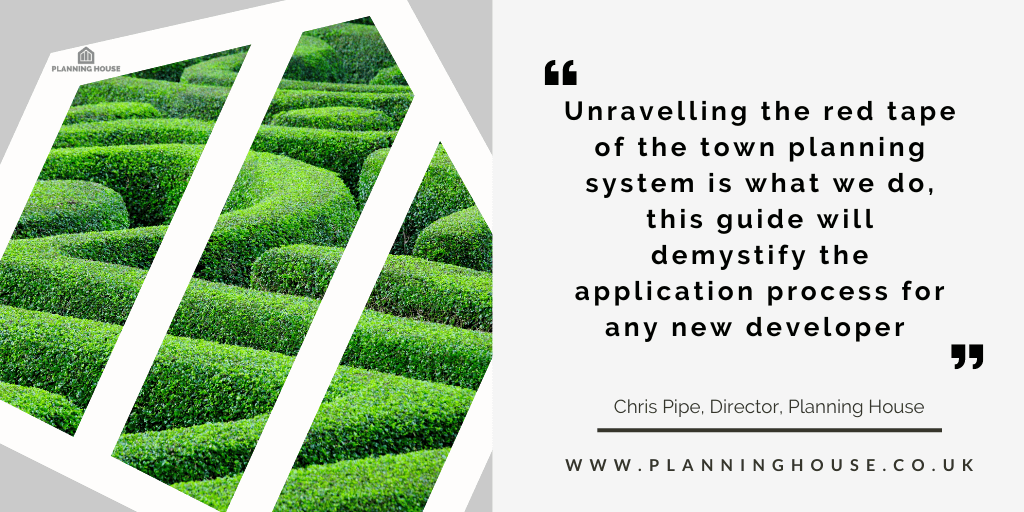Let’s be honest – the world of planning can seem like a bureaucratic maze. But fear not, this guide will demystify the process of planning applications so your projects can get off the ground with ease. Our Handy Guide to the Planning Application Process or our FREE eBook about the application process gives a basic understanding of the planning process, however this basic guide provides an overview.
Types of Planning Applications: Picking the Right Path
There are a few main types of applications to know:
Outline Applications are a good first step if you want to test the waters before spending big. They establish the principle of development but leave details open.
Full Planning Applications provide the full specifics and are needed to actually start construction.
Reserved Matters Applications follow Outline approval and tackle any outstanding points like appearance, access, layout etc.
Other Application Types cover everything from advertisements to permissions in principle – but Outlines and Fulls are what most developers deal with.
Timelines: Managing Expectations
Standard applications aim to be decided in 8-13 weeks – but complex ones may take longer. However you need to be aware that extensions to time are common so be ready to flex timelines. Although the Government is proposing to limit the use of the mechanism to secure extensions of time this means it will make it even more important that an application is correct when its submitted.
You can speed things up by front-loading your application with all details required from the get-go. Avoid delays by triple-checking everything is in order!
The Planning Process: Step by Step
Here are the basic steps in the planning application process in England:
- Pre-application consultation (optional but sometimes recommended depending on your proposal, take a look at our article Is the Pre-Application Process worth doing? – Discuss your proposal with the local planning authority before submitting an application. This helps identify any issues early on.
- Submit the planning application – Provide all necessary plans, documents, and fees along with the correct application form (either outline, full or reserved matters). Most are submitted online now, however be aware there is an additional fee for using platforms like the Planning Portal.
- Validation – The planning authority (i.e. Council) checks that everything required is provided. If not they’ll ask for more info before validating and starting the process. Avoiding delaying in Validation is important.
- Public consultation – Details of valid applications are advertised by neighbour notification letter, online and sometimes by press and sit notice seeking comment over a 21 day period. Neighbours and consultees can respond. However be aware that anyone can who has a view on your proposal can comment.
- Consideration by case officer -Once you submit an application a planning professional (known as your case officer) is allocated, they seek comment from consultees and neighbours, review your proposal against policies, carry out a site visit and ultimately make the recommendation on your proposal so Making an ally of your planning officer is a no-brainer! They may ask for revisions or determine the application as it is. Be aware there is no obligation on the Council to discuss the application with you prior to determination.
- Decision deadline – Standard applications are decided within 8-13 weeks, but can be extended if needed.
- Decision – Permission may be granted, granted with conditions or refused. Reasons and appeal rights will be provided with the decision notice.
- Compliance with conditions – If approved with conditions, applicants must comply in order to implement permission fully. Our article Understanding Planning Conditions details the top 5 things to know about planning conditions. And in our Practical Guide to Planning Conditions we give you the basics of what you need to know about conditions. Feel free to take a look!
- Appeal process – Applicants can appeal refusal decisions or non-determination if no decision is given within the proper period. Our Top 10 tips when considering appealing a planning refusal. Knowing your options should you find yourself in a situation where your planning application has been refused will allow you to make informed decisions on how to proceed. Or take a look at our articles Know your Options if your Planning Application is Refused or Securing Planning Permission for a Site which has been refused planning permission.
How can Planning House help you?
For all your application needs, Planning House is here to smooth the way. We can play an invaluable role in guiding clients through the application process from start to finish. Here are some of the key ways we help:
- Pre-Application Consultation: We discuss with clients their project ideas early in the process, review site constraints, and provide guidance on the best application route. This helps set expectations and avoids costly mistakes down the line.
- Application Submission: We assemble all the necessary plans, supporting documents and fees into a polished application packet tailored to the specific site and development type. You may need additional sub contractors to provide necessary plans and information. Having a planning consultant onboard gives applications the best chance of success.
- Liaison with Council: Planning House acts as the point of contact with the local authority, answering any queries and ensuring deadlines are met. This keeps applications moving forward instead of languishing.
- Planning Presentations: Planning House can attend committee meetings to passionately present projects, field questions and request approvals, if required, however sometimes we advocate this is done by the client.
- Decision Management: Whether celebrating an approval, discharging planning conditions or considering next steps after a refusal, our post-decision guidance smooths the way.
Related Content
You don’t always need a town planner, If you’re not sure if you need help from a Town Planner take a look at blog on When to Hire a Town Planner our download a Guide on How to Choose a Town Planner and if you do need some assistance with your development proposal, CONTACT US.


